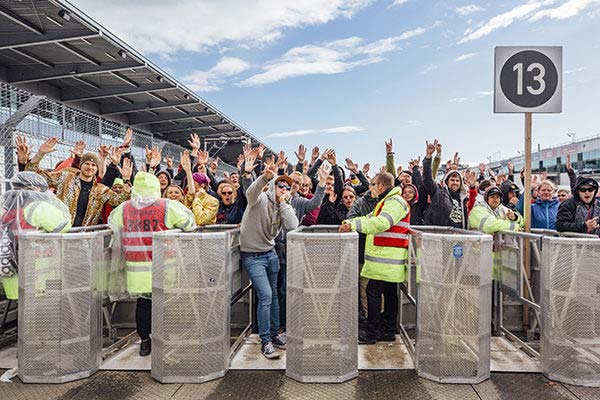Are you preparing to manage your onsite ticketed event? Here are the essential dos and don’ts to ensure a smooth experience for both you and event attendees.
The following things will allow you to have smooth entry and easy arrival for your guests at a onsite ticket operations.

Planning Process:
Make sure that you have put together a clear plan for the entire event. This includes; determining amount of staffing, shifts, weather contingencies, shade structures and access to water. For extra help with some of these items we found a great step by step guide HERE. Starting with step 6 onwards will surely be helpful to an organizer.
Training Best Practices:
Get in touch with your Afton Tickets account manager so they can send all of our equipment and onsite resources that you will be able to share amongst your onsite team. Along with this it is crucial to have an onsite huddle before doors/gates open so that your team can get all of their equipment questions answered prior to the event.
Train scanning staff to discern when to permit or deny entry based on the scanner message displayed after scanning a ticket. Often, untrained staff may overlook “Not Valid” or “Deny Entry” messages and allow attendees to enter regardless. Establish clear guidelines so that when any “not valid” messages appear, staff immediately notify a manager to decide on the appropriate course of action. Failure to enforce this can result in attendees fabricating stories to gain entry without a valid ticket, undermining the effectiveness of your ticketing system. Remember, the reliability of your ticketing system hinges on the proficiency of your least trained scanning employee.
Accurate Scan Data:
Accurate scan data relies on your scanning staff using equipment properly and ensuring every attendee’s ticket is scanned before entry. It’s crucial to train your scanning staff on their primary responsibility: permitting entry only to those with valid tickets. They act as gatekeepers and must grasp that this responsibility is paramount to their role.
Arrive Early and Prepared:
Arrive well before the event to set up and familiarize yourself with the venue and box office gear. Being prepared ensures you can address any issues promptly.
Cash Management:
Cash management security is frequently overlooked, leading to inaccuracies, missing funds, and other complications. Ensure your team adopts a clear cash management policy and schedule regular cash drops to prevent shortages that could hinder transactions.
Streamline Entry Processes:
Use efficient ticket scanning and organize lines for swift entry. Simplify the process to minimize waiting times for attendees. Separating pre-bought tickets buyers from those that need to purchase at the gate.
Ensure there are physical barricades dividing the entry lines; vertical “Bike Racks” are highly effective for this purpose. Without these barriers, there is a risk of your scanning staff being overwhelmed by the crowd, making it impossible to scan tickets individually. Implementing physical barriers ensures that your scanning staff can control entry, scanning each ticket systematically, and maintains orderly single-file entry lines rather than a chaotic cluster of people.
Provide Clear Signage:
Guide attendees with clear signage for onsite ticketed event counters and important information such as prohibited items or bag checks. Clear signage reduces confusion. We also recommend having an Afton Tickets sign near the box office as well to help prevent chargebacks. If customers see this there are more likely to not think the charge on their card is fraud once they get their statement.
Maintain Communication Channels:
Stay in touch with your team and event organizers for smooth coordination. Effective communication ensures everyone is on the same page.
Remain Customer-Focused:
Prioritize excellent customer service to assist attendees effectively. A positive interaction can enhance the overall experience. Make sure to create clear policies and escalation paths so that your staff is trained up on when to escalate or how to handle issues that arise.
Be Flexible and Adaptive:
Stay flexible and adjust strategies based on changing circumstances. Being adaptive allows you to handle unexpected situations effectively. This includes keeping an eye on the inventory of your sellable items. You never want to run out and miss a sale that could have been avoided by simply raising the inventory of that item.
Implement Security Measures:
Ensure robust authentication measures are in place to prevent fraud and unauthorized entry. Security is paramount for the safety of attendees.
Don’ts:
Neglect Staff Training:
Invest in comprehensive training to avoid inefficiencies. Well-trained staff can handle various situations with confidence.
Overlook Technical Checks:
Test equipment thoroughly and have backups in place. Technical issues can disrupt operations if not addressed beforehand.
Compromise Security for Speed:
Prioritize security protocols over expediency. Safety should never be sacrificed for efficiency.
Mismanage Queues:
Organize queues effectively to minimize congestion and wait times. Poor queue management can lead to frustration among attendees.
Ignore Feedback:
Listen to attendee feedback for areas of improvement. Addressing concerns can enhance future events.
Underestimate Contingency Planning:
Develop comprehensive plans for potential issues or emergencies. Being prepared ensures you can handle any situation effectively.
In conclusion, excelling at onsite ticket operations demands a combination of preparedness, efficiency, communication, and a relentless focus on attendee satisfaction to ensure it goes smoothly at an onsite ticket operations. By arriving early, streamlining processes, providing clear signage, and maintaining robust security measures, you lay the groundwork for a seamless experience. Additionally, prioritizing staff training, technical checks, and proactive contingency planning are essential to handle any challenges that may arise. Ultimately, by adhering to these dos and don’ts, you can ensure smooth operations, enhance attendee satisfaction, and contribute to the overall success of any event.
And for all you Concertgoer’s that are looking for great events you will be able to see from our website there are a ton of different events with various seating charts so you can pick were you want to sit. We hope this was a great guide for you!
Other Articles

